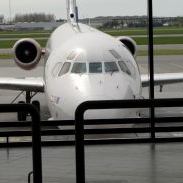Travel Tips
Yemenia Airlines Crash Brings Call for Expansion of European Airline Blacklist
 In the wake of the tragic crash of Yemenia Airlines Flight 626 near the Comoros Islands, it has been revealed that French safety inspectors had serious doubts about the Airbus A310 craft and had banned it from entering the country in 2007.
In the wake of the tragic crash of Yemenia Airlines Flight 626 near the Comoros Islands, it has been revealed that French safety inspectors had serious doubts about the Airbus A310 craft and had banned it from entering the country in 2007.
Though the airline had not been placed on the European Union’s safety-related blacklist of air carriers forbidden to enter the EU, the French had banned that particular Yemenia plane from entering France.
The fact that safety inspectors had previously discovered problems with the plane has led to calls by some, including the EU’s transportation commissioner, for an international expansion of the airline blacklist.
Read more about the crash with Yemenia Airlines Crash Update: One Child Survives, Black Box Still Missing.
The EU’s current list blocks dozens of airlines around the world from flying into Europe. And while it can (and should) be used by passengers worldwide to investigate the safety of airlines, it has no legal authority outside the borders of the European Union (except in Norway and Switzerland, which are not EU countries but signed up for the blacklist).
But now, EU Transport Commissioner Antonio Tajani has called for a global blacklist that would presumably block unsafe airlines from flying into any country that signed on to some sort of new global air safety treaty.
 Interestingly, while Yemenia Airlines had not been placed onto the EU’s blacklist, its safety record was under close scrutiny by European authorities. Deficiencies in Yemenia’s maintenance and engineering operations and an investigation into the Yemen-based airline had led to the discovery of “verified evidence of non-compliance with specific safety standards.”
Interestingly, while Yemenia Airlines had not been placed onto the EU’s blacklist, its safety record was under close scrutiny by European authorities. Deficiencies in Yemenia’s maintenance and engineering operations and an investigation into the Yemen-based airline had led to the discovery of “verified evidence of non-compliance with specific safety standards.”
A plan was put in place to correct the problems—and a follow-up report did “acknowledge the efforts employed by Yemenia to correct the detected safety deficiencies.” While this finding allowed Yemenia to escape being blacklisted at the time, the report called for European nations to “verify systematically” that the airline was consistently maintaining safety standards.
The Chairman of Yemenia, Abdulkalek Saleh Al Kadi, declined an invitation to the EU’s Air Safety Committee meeting on July 2, saying “all our resources are working on the crash investigation.”
In response to questions about Yemenia being added to the blacklist, Al Kadi also said “of course we’re concerned about being blacklisted, but the E.U. should be fair in its judgment. After 40 years of flying without problems, they can’t suddenly decide to put us on a blacklist because of one accident.”
The presumed sole survivor of the Yemenia Airlines crash, a teenaged girl of French-Comoran heritage, Bahia Bakari, was recently reunited with her father in Paris. Her mother is presumed to be among the 152 people killed in the crash.
By Matthew Calcara for PeterGreenberg.com.
Related links: Gadling, Boston Globe, Dow Jones Zawya, Aviation Week
Related links on PeterGreenberg.com:
- Travel Detective Investigates Air France Flight 447 & Commuter Jet Safety
- Former NTSB Lead Investigator on Air France Flight 447
- Experts Discuss Theories on Crash of Air France Flight 447
- Air France Crash, Acapulco Shootout Top Travel News
- Found Debris NOT From Downed Jet; Air France Issues Warnings, Replaces Sensors
- Wreckage of Missing Air France Flight Identified; Cause Still Unclear
- Travel Safety & Security: Plane Crashes News Archive












